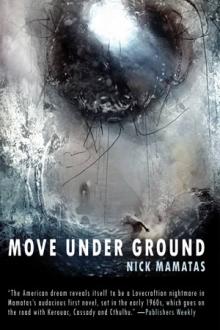Move Under Ground by Nick Mamatas (guided reading books .txt) 📕

- Author: Nick Mamatas
- Performer: 0809556731
Book online «Move Under Ground by Nick Mamatas (guided reading books .txt) 📕». Author Nick Mamatas
Then I remembered that I’d never actually killed anybody before. For all the drinking and train-hopping and mix-ups in school and in the Navy, I’d never really done much more than get into a half-fun shoving match with a drunk. Even when I was a security guard, I never bothered to load my gun. It was a grace. I didn’t swallow the pain; I never nursed the old childhood rages at being messed with for speaking joual with Memere (the kids would surround me, quack like ducks, then run their fingers over their lips—that’s what they heard they said). Broken hearts, I mended them with the tiny hands of the girl next door, or one the next county over. I drank with Negroes one day, and nodded through boisterous laughing jokes with Klansmen the next. I embraced all of them, the women, the old men, little kids playing secret games, America was mine. Resistance makes the spirits real, I remembered the teaching now. Embrace the madness with no attachment, something that is both the hardest and easiest thing in the world. I did it with a sigh and then slumped down to meditate in a little puddle. The yelps and oohoohoohing carried on deep in the dancing black spiral of the tunnel system while I sought the no-self.
Massachusetts. Winter. So cold, like the weather was frozen in my little bird bones and just radiated outward from my marrow, to permeate my skin, freeze my clothes stiff, and to steam my breath. I don’t remember the snow crunching under my boots, because it never did. I was a light boy, a slim little lad, and snow only crunches in books. The true memory, the real Ti Jean never heard any such thing. He heard, I heard, my lungs in me, breathing hard, expanding and deflating like leather billows. The quacking boys are gone now, into the trees. Every tree hides someone, I decided, right then and there. Some were evil and hiding in wait, or from justice itself. Other trees, the peculiar ones with split trunks or weird leaves, or with sheathes of ivy wrapping, those are where the good people hid. Some from evil, some laying in wait, ready to spring forth with candy or advice or fists of iron, ready to face down the bad boys on behalf of young cats with runny noses like me.
I looked around the field—I’d wandered over the hill and was just out of sight of my house. Memere would be worried. I turned back to the small grove of trees, some good and some evil. I ran towards them, toes suddenly awake and stinging in my wet boots, ready to take cover behind a tree, to decide once and for all who I’d be. Behind a fir, my soul went to the devil, behind a maple, to the angels. I ran so fast, faster than I ever had, ready to take a cosmic side, so excited to be running that I just ran through the grove and forgot to hide behind a tree entirely. I plopped down to my knees, half from the exertion of running so hard in my winter coat and scarf, half from the joy of getting wet and kneeling if I darn well wanted to. I stayed there for a while, watching the white snow turn gray but for the tiniest icy star twinkles as the sun went down. For a long time, until I was darn good and ready, I stayed out in the field, and just as twilight painted the sky, I got up and went home.
Memere wasn’t angry when I got home so late, with my pants soaked and then chilled over (I even walked into the living room stiff legged, to show off). Gerard, my brother, had just died. She told me the fever took him and we said nothing. I didn’t cry, because I was afraid the tears would freeze on my cheeks. I was seven.
And that memory, that milestone of the self, I lived it again sitting on a puddle in the middle of a haunted sewer, lived every forgotten tear and chilly leaf, then typed it up on the Underwood in my mind, cranked the paper out of the carriage, crumpled it up into a little ball, and then threw it away. A fiction, memory coated with details from books and the demands of drama. That’s me, Jack Duloz, Jack The Louse. Away.
And without self I stood up, my butt soaked with black sewer water, and walked again towards the huffing and yelping and mad gangster giggling (“heh heh heh heh heh.” Edward G. Robinson discovers bennies) with open hands and an open heart.
The purple rose of dusk dimmed the light from the sewer gratings over my head as I turned the final corner and saw Allen. In the splash light of a fallen flashlight, he was buggering some young man, the cat bent over and his curls shaking with each of Allen’s thrusts. They were both making the noises, girly and squeaking like old shoes. I’d never quite gotten the etiquette on interrupting homosexual sodomy before, so I just walked up to the pair, looked Allen in his (squinting, ecstatic) eyes and asked just what the hell was going on.
“The” he said, then huffed. “Whole.” Another huff. “City.” Two thrusts, the boy with the curls grunted, “is—”
“Okay! Stop and just tell me! Send the boy away!” I turned my back on the pair. I heard some shuffling, bumping and zipping up, then footfalls scrambling away up a ringing ladder. I turned back to see Allen there, licking his fingers and dabbing his thick eyebrows, “Really Jack, I’m sorry. You know, I have a problem. A compulsion, it’s like a disease, a sickness in me. I can feel it squirming around my spine.”
“Not you. Them,” I told him, glancing up towards the ceiling, towards The City. I would as soon forget the whole nasty business.
Allen shrugged. “You saw it didn’t you? The faces, empty or insectoid. They can’t see it. A couple of … friends, have even been institutionalized for insisting that they see the mugwumps. The more straitlaced a person is, the greater the transformation, the deeper they bow to the Dark Dreamer,” he said, and bowed low himself, his hands fluttering.
I opened my mouth to say something, to just tell Allen to shut the hell up already and tell me where Neal was going, but he interjected, “It is actually pretty amazing, who hasn’t fallen to the Cult of Utter Normalcy, really. The local state assemblyman is a good guy. Must be the time he puts in brainstorming with his constituents down at the—”
“Stop,” I said, almost angry, almost full of attachment and desire, but then I smiled. “I understand. So, you’re going to hold down the fort here?”
“Spread the madness! Larry’s out of town, so is Neal. After he got out of the joint, he … changed. I mean, the man’s still fine, still crazy. He just got old.” Allen slumped down onto his haunches, “We all got old, man. All except you. He’s off to Nevada to go open a gas station.” Allen nearly spit, “Damn, he wants to support his kids. The rugrats he calls ‘em! Rugrats, Jack!” I let Neal’s rugrats wash over me, then took a step and walked past Allen.
“Nevada. Sodom in the American desert. Gas and hot air. What’s the lure, the filthy lucre? I mean, Neal, damn, he can’t have gone straight,” Allen said behind me. “Jack?” I turned and looked at him, hunched over like a bridge troll, his marionette string shadows playing on the curved wall behind him. His flashlight was burning orange and weak now, like the dimming light of the world. I knew he wasn’t going to be moving tonight. Maybe he had a pocketful of pills to keep him up and frantic in the dark, maybe he’d sleep in his own piss or jerk it all night ‘til he was bleeding, just to keep from joining the mass of maggots topside on the rotten flesh of town.
“You need any money?” he asked. The tainted money. The cursed money that the Lord’s own rats had thankfully chewed to pieces before I stepped on the road again. Money chained Neal to the road, to a pipe dream leading to a roadside filling station in Nevada when he was needed here to fend off the inky darkness.
“No, I own the entire world already,” I told him, and I reached into my pocket and tossed him the little crowbar he’d lent me before. I took to the nearby ladder, pushed the manhole cover open with my head and shoulder, then slipped out on the dark and slick streets again. Like the back of a beached whale, nice and slick and curving towards the depths. Ah, it was just another hill in a damn town full of them, but without a lick of traffic. A century of Mother Earth flexing her black and fiery muscles to throw this town off her back hadn’t been enough of a hint, so she called in Bigger Brother for reinforcements, and The City just wasn’t big enough for the three of us. I looked up again, looked up at the moon, a flaming silver half-lidded eye. He was a big one, the kind of fat schoolyard bully who likes pulling legs off spiders just because little round nubs are more interesting looking than graceful stilt-legs. I stood there for a long time, my neck craned upwards in a staring contest. Tentacles thick as buildings shifted in and out of the fog, pouring from Cthulhu’s chin and stretching out from the sea, brushing the tops of buildings and then reaching out all across this gray land. Go East young man, catch me if you can. But oh I can. My heart was a metronome; I’d sweated out the Benzedrine in Big Sur and calmed my nerves with the tart juice of the juniper berry in sweet, decayed Frisco. The last good bite of rotten fruit. I’d left the ghost of old Gerard in the underworld, along with sick Allen and his last pair of stained slacks. I put out a thumb and by the force of Buddha’s palm, a truck stopped for me. Without a word I stepped up and slid into the cab, slammed the door behind me and we drove off, into the depths of America.
The best thing about riding with a trucker like Ed was his ready supply of solid laughs and a glove box full of bennies. He was taking them by the handful and not bothering with the Coke he held between his knees. “Both hands on the road, eat the yelleh line all up,” he said over and again. Ed wouldn’t take the new interstates being slapped up; he said that there were too darn many moon rockets being hustled left and right on wideload trailers. “They say they’re fer the Reds, heck, they say the rockets don’t even exist, but if you see ‘un, it’s fer to blow up the Reds, but I know betteh. Rockets to the moon. Sekrit bases on the fahr side of it. I see ‘em firin’ in the desehrt,” he said, not once or twice, but every time he took





Comments (0)